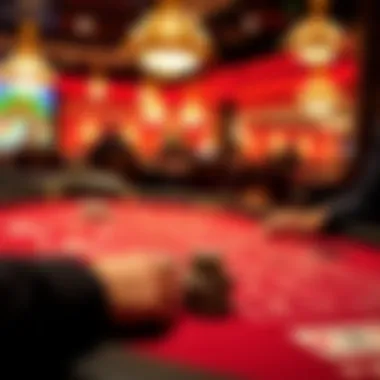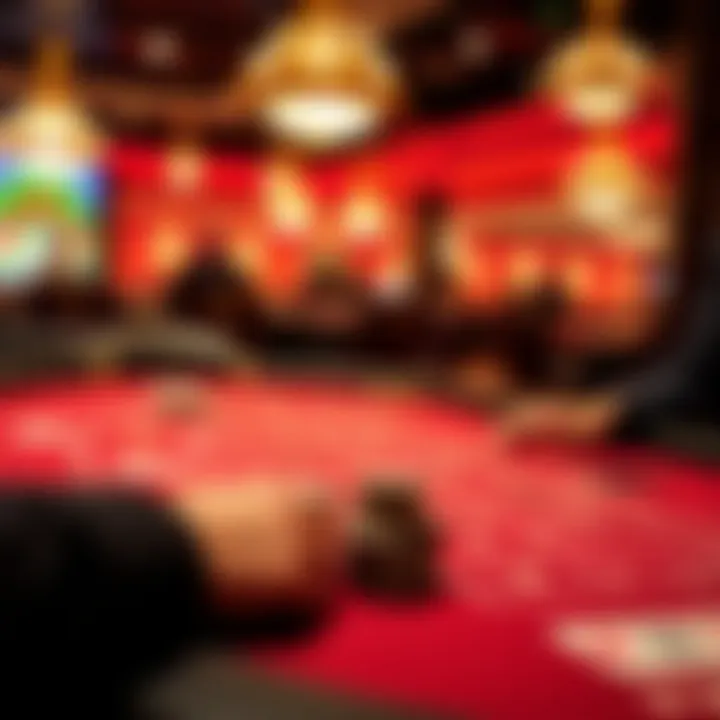Exploring the Complexities of the Blackjack System


Intro
Blackjack. The very word brings to mind the sounds and sights of bustling casinos. Yet, while many may relish the thrill of placing their bets and turning cards, few truly grasp the depths of this classic game. It's not merely luck at play; there's a complex mix of strategy, psychology, and discipline in the mix. This article aims to break down these components and foster a deeper understanding of the intricacies behind the blackjack system.
Understanding blackjack goes beyond memorizing rules—it's about recognizing how each decision made at the tables can stitch together a narrative of potential wins or losses. From how to handle your chips to predicting the dealer's next move, there’s a lot more beneath the surface. So, whether you’re a seasoned gambler, a casino employee hoping to enhance your knowledge, or a curious onlooker, there's much to learn.
The strategies in blackjack are as varied as the people who play the game, and they can influence the outcome significantly. Moreover, mental discipline, careful bankroll management, and a grasp of the psychological nuances at play can make a world of difference in how one performs.
Even on a broader scale, the ethical implications of gambling are becoming increasingly critical, especially in today’s rapidly evolving casino landscape. As we delve deeper into the sections that follow, this exploration will provide valuable insights into aspects that often remain unspoken.
As we venture forth, we will layout key strategies that can guide your gameplay, providing a platform for those who seek both to enjoy and excel in blackjack.
Let’s dive into the world of game strategies.
Prelude to the Blackjack System
Blackjack is not just another card game; it is a vivid tapestry of strategy, chance, and psychological warfare. When stepping into the realm of blackjack, whether at a brick-and-mortar casino or an online platform, grasping the basics and intricacies of the system is essential for any player. This section aims to serve as a foundational piece, shedding light on the historical significance and the unique mechanics that characterize the game.
Historical Context
The roots of blackjack can be traced back to the 17th century, specifically to a French game called "Vingt-et-Un," which translates to "Twenty-One." In the early days, the game adopted a decidedly different flair, but it soon made its way to America, where it evolved and captured the imaginations of gamblers from coast to coast.
As the game became popular, various rule modifications were introduced, notably during the early 20th century when casinos began to emerge. The initial allure of special payouts for unique hands, like the 'blackjack' itself—a combination of an Ace and a ten-point card—added to the game's mystique. Over the years, blackjack has been associated with not just luck, but also skill, leading to sophisticated strategies that players and professionals alike still analyze today.
One might say blackjack is a living tradition, constantly adjusting to the cultural nuances of the era. Whether in the smoky rooms of a Las Vegas casino or the digital landscapes of modern gaming sites, understanding this history provides context for strategy development and gameplay understanding, making it a vital component for every aspiring blackjack player.
Overview of Game Mechanics
At its core, blackjack revolves around the conflict between the player and the dealer, where the goal is to achieve a hand value as close to 21 as possible without exceeding it. Each player is dealt two cards, which can be either face up or down, depending on the specific game’s rules. While the numerical values of the cards seem straightforward—cards 2 through 10 are valued at face value and face cards (Kings, Queens, Jacks) are worth 10—Aces can be both 1 or 11, giving players an additional layer of strategic choice.
After the initial deal, players have several options to enhance their gameplay:
- Hit: Take an additional card to improve hand value.
- Stand: Keep the current hand and end the turn.
- Double Down: Double the initial bet and receive one more card.
- Split: Divide two cards of the same value into two separate hands.
- Surrender: Forfeit half of the bet and end the hand early (availability dependent on house rules).
The dealer plays according to fixed rules, typically hitting until reaching at least 17. If a player surpasses 21, they automatically lose, which is known as a "bust." The dealer must reveal their second card, and then the winner is determined based on who has the hand value closest to 21.
Understanding these game mechanics is crucial for developing strategies and making informed bets. With a myriad of variations such as European, American, and Spanish blackjack, players need to navigate the nuances that can affect gameplay outcomes. Knowledge of the mechanics won’t guarantee success, but it lays the groundwork for more advanced strategies and tactical decision-making further along in this exploration.
The Fundamental Rules of Blackjack
Understanding the fundamental rules of blackjack serves as the foundation of successful gameplay. These rules not only delineate how the game is played but also inform players about the strategic decisions they will have to make throughout their experience at the table. By grasping core concepts, players can enhance their skills and improve chances of winning.
Understanding Card Values
In blackjack, knowing the values assigned to each card is crucial. The cards from 2 to 10 hold their face value, whereas face cards, such as kings, queens, and jacks, are all valued at 10. Aces, however, can take on a dual role—providing a value of either 1 or 11, depending on what aids the player’s hand best. This flexibility opens up various strategic pathways. For instance, if you hold an Ace and a 7, you can choose to play it as either 8 or 18, and this choice influences not only your play but also how you react to a dealer's showing card.
To illustrate:
- A hand of 10 and 8 equals 18.
- A hand of Ace and 7 can be 18 or 8.
This duality in value makes understanding card values not just a matter of knowing numbers, but a strategic element in decision-making and predicting outcomes.
Gameplay Objectives


The primary objective in blackjack is simple yet profound: players aim to beat the dealer by having a hand value closer to 21 without exceeding it. When a player busts—meaning their hand exceeds 21—they forfeit the round. However, to succeed consistently, one must also appreciate the significance of the dealer's hand, typically less flexible due to rules restricting the dealer on hitting or standing based on their total. Players need to not only focus on their hand but also observe the dealer's visible card, which adds another layer to strategy during the gameplay.
Strategies such as hitting or standing depend on the player’s total compared to the dealer’s upcard. It's critical to adjust your gameplay based on the situation at hand, making this understanding key in forming a cohesive strategy.
Common Variations of Play
Blackjack isn't a one-size-fits-all game; there are various adaptations that can shift the experience and rules of engagement. Some popular common variations include extra rules or side bets:
- European Blackjack: In this version, the dealer only receives one card initially, a unique twist that changes the strategy.
- Spanish 21: This variant strips the deck of all 10s, altering card counting methods and strategy complexity.
- Pontoon: A version where both dealer’s cards are hidden, adding an additional layer of suspense and strategy.
Understanding these variations equips players with the knowledge to adapt to different scenarios they may encounter, allowing for a broader analytical approach to the game.
"Knowledge of rules is not just about compliance; it's about winning."
Basic Strategy for Players
Understanding basic strategy in blackjack is essential for anyone aiming to increase their odds of winning over time. It forms the crux of a player's decision-making process at the table. By employing a sound strategy tailored to the game's mechanics, players can potentially minimize the house edge, shifting the odds slightly in their favour. Instead of relying on luck, a good strategy empowers players with a structured approach, allowing for informed decisions based on statistical probabilities.
Simple Strategy Charts
One of the key tools at a player's disposal is the strategy chart. These charts provide a visual guideline for optimal moves based on the player's hand and the dealer's upcard. For instance, if a player has a total of 16 and faces a dealer's 10, the chart might suggest a stand. Simplifying complex decisions into clear directives, strategy charts allow players to make choices quickly and accurately.
Here’s an outline of common scenarios that a beginner might find on these charts:
- Hit when your total is 11 or less.
- Stand on 17 or higher.
- Double Down on 10 against a dealer's 9 or less.
- Split pairs like Aces or 8s against any dealer card.
Utilizing these charts consistently can lead to a more disciplined and strategic gameplay experience.
"By sticking to a basic strategy, you're effectively lowering the house edge, which gives you a better shot at winning in the long run."
Adapting to Different Situations
The fluid nature of blackjack means that adaptability is critical. While basic strategy provides a strong foundational approach, players must also consider particular situations that may warrant deviation from the standard play. For instance, factors such as table rules, deck counts, and even player positions can influence strategic decisions.
- Understanding Variants: Each blackjack variant might have rules affecting play. For example, some tables allow surrendering a hand, while others do not. Being fluid with your strategy can help when navigating these variations.
- Environmental Awareness: The dynamics at the table, like player behaviour and the dealer's style, can also inform decisions. If you notice aggressive players, a more cautious approach may be necessary.
- Psychological Factors: If you find yourself feeling overwhelmed or anxious, it is vital to stick close to basic strategy to avoid impulsive decisions that may lead to losses.
By recognizing these elements and adapting strategies, players can ensure they are not just following rules but actively engaging with the game in a more nuanced manner.
Advanced Blackjack Strategies
In the realm of blackjack, advanced strategies often set experienced players apart from novices. Understanding the deeper layers of the game can lead to better decision-making and significantly enhance one’s winning potential. Advanced blackjack strategies encompass not just game mechanics but also the psychological aspects of gameplay and the interplay of risk and reward.
Card Counting Techniques
Card counting is perhaps the pinnacle of advanced strategies in blackjack. This technique involves keeping track of the ratio of high-value cards to low-value cards remaining in the deck, allowing players to adjust their betting strategies accordingly. While it might sound simple, mastering card counting requires practice and discipline.
- Hi-Lo System: The most widely used card counting method. Assigns a value of +1 to low cards (2-6), -1 to high cards (10-A), and 0 to neutrals (7-9). This helps players maintain a simple yet effective count as the game progresses.
- Knockout System: This variant eliminates the need to convert the running count into a true count, making it suitable for players who want a more straightforward approach.
Card counting can give players an edge by indicating when to increase bets, maximizing winnings during favorable situations. However, it's not without its challenges; casinos are vigilant against skilled counters and employ countermeasures. As a player delves deeper into card counting, blending this technique with a solid understanding of game rhythm and dealer tendencies becomes essential.
Betting Systems Overview
Betting systems play a crucial role in blackjack strategies, offering frameworks for managing stakes and optimizing returns. Various systems can be applied, each with specific goals and methods.
- Martingale Betting System: This popular method involves doubling your bet after every loss, with the aim to recover all losses with a single win. It’s straightforward but can lead to significant capital requirements and potential for loss streaks.
- Paroli System: A more conservative approach with the goal of capitalizing on winning streaks. Players increase their bets after wins instead of losses, allowing for a less aggressive risk profile.
- Fibonacci System: This system is based on a mathematical sequence where each number is the sum of the two preceding ones. It encourages a gradual increase in stakes rather than the aggressive doubling of the Martingale.


No matter the system chosen, understanding its mechanics, risks, and how it aligns with one's playing style is paramount. Successful implementation can help maintain control over gambling habits and make informed betting decisions.
Risk Management and Bankroll Control
Effective risk management and bankroll control are cornerstones of advanced blackjack strategies. Without proper management, even the most refined strategies can collapse under financial missteps.
- Set Limits: Before even sitting at the table, established limits for wins and losses should be defined. This could be a fixed dollar amount or a set percentage of your total bankroll.
- Buffering Your Bankroll: Maintaining a safety net within your bankroll allows you to withstand losing streaks without quickly depleting your resources.
- Session Management: Establishing a clear number of hands to play or a specific time limit helps to mitigate impulsive behaviors that can arise from prolonged gaming sessions.
"In the game of blackjack, it's not just about playing the cards dealt; it's also about playing the player, the dealer, and yourself."
In summary, advanced strategies in blackjack hinge on a multi-faceted approach: skillful card counting, intelligent betting systems, and disciplined risk management. Players willing to invest the time to learn these strategies often find that their gameplay becomes not just more profitable, but also far more engaging.
Psychology of the Game
The realm of blackjack transcends mere arithmetic and strategy; it is also deeply intertwined with psychological elements that affect how players engage with the game. Understanding the psychology of the game can provide players an edge that goes beyond basic strategy charts and counting cards. Key aspects such as decision-making under pressure and emotional control at the table are paramount, influencing outcomes significantly and dictating a player's experience.
Understanding psychological factors enables players to navigate not only their responses but also anticipate the behaviors of others at the table. This layer of the game is crucial for enhancing odds, minimizing losses, and maximizing wins. Moreover, it's the intangible aspects that often separate the seasoned players from those merely relying on luck. Recognizing patterns, managing one’s mental state, and fine-tuning focus can all dictate the trajectory of a game session.
"The most important part of playing blackjack isn't the cards themselves, but how you play the game between your ears."
Decision-Making Under Pressure
In blackjack, the stakes can rise swiftly, often creating a tense atmosphere. The ability to make sound decisions under pressure is vital. In heated moments, with chips on the line, players must evaluate their options quickly. Are they standing, hitting, or doubling down? The split-second choices players make can be influenced by stress, excitement, or fear, which may cloud judgment.
The best players maintain a clear mindset. They often rely on practiced strategies and remain focused on the necessary information. To bolster effective decision-making, players can practice various techniques:
- Visualization: Imagining different scenarios before they happen helps build confidence and calm nerves.
- Breathing Techniques: Simple deep breathing can mitigate anxiety, making it easier to think clearly when the game heats up.
- Simulation Exercises: Engaging in simulated games prepares one mentally for real-life pressure, refining decision-making skills.
Each of these practices allows players to strengthen their resolve, leading to more consistent gameplay.
Emotional Control at the Table
Emotions can be as unpredictable as the deck itself. Maintaining emotional control is another fundamental aspect when participating in blackjack. Players often experience a rollercoaster of feelings—exhilaration after a winning hand or despondence when things go awry. Such fluctuations can spell disaster if not managed effectively.
Successful players recognize the importance of emotional regulation and cultivate habits that help maintain their composure. Here are key considerations to manage emotions during play:
- Self-Awareness: Being conscious of one's emotional state helps identify moments when feelings might influence decisions.
- Breaks: Taking short breaks allows players to reset and return with a clearer mindset, especially after a bad run.
- Grounding Techniques: Simple actions, like focusing on surroundings or physical sensations, help center emotions and banish distractions.
Navigating the emotional landscape at the blackjack table is crucial. It prevents losses stemming from rash decisions driven by impulse rather than strategy.
These psychological insights help form a solid foundation for a player’s approach to blackjack. Mastering them can bridge the gap between average performance and expert play.
Ethics and Responsibilities in Gambling
The conversation surrounding ethics and responsibilities in gambling is crucial for anyone involved in the Blackjack scene. It's not just about the thrill of the game or the chance to win big; there are deeper implications that touch on personal accountability and wider societal impacts. Understanding the moral compass guiding gambling practices informs how players interact with the game, and it lays down a framework that's beneficial for both individuals and the community.
Understanding Responsible Gambling
Responsible gambling means ensuring that the games remain a source of entertainment instead of becoming a financial burden. Players must recognize their own limits: it's essential to set boundaries regarding time and money before stepping into a casino or logging onto an online platform. This understanding can prevent a social pastime from spiraling into a dangerous obsession.
Some practical steps include:
- Setting a Budget: Decide on a fixed amount to gamble, and never exceed it. This prevents feelings of regret and keeps the experience enjoyable.
- Time Management: Allocate specific hours for playing. Overindulgence can lead to poor decision-making, and it can erase the fun.
- Self-Exclusion Programs: Many casinos offer programs that allow individuals to voluntarily restrict their access. This can be a useful tool for those who feel they've lost control.


Responsible gambling should feel like a shield against the darker sides of the game. Knowing the signs of unhealthy gambling can be a life-saver. Educating oneself about risks and engaging in self-reflection are key practices to ensure that the game is enjoyed safely and ethically.
The Impact of Gambling Addiction
Gambling addiction is not just a personal struggle; it reverberates through families and communities. The effects can be devastating, leading to financial ruin, strain on relationships, and a host of psychological issues.
According to studies, the following consequences are often observed:
- Financial Difficulties: Gambler's debts pile up, often resulting in loans or theft, which can devastate families.
- Mental Health Issues: Many face anxiety, depression, or even thoughts of self-harm as a result of their gambling. The pressure of accumulating losses takes a toll.
- Societal Impact: The stigma associated with gambling addiction can isolate individuals, creating a vicious cycle that further exacerbates their struggles.
"Understanding the ramifications of gambling addiction is vital; it’s like a ripple effect that can touch every aspect of a person's life, from relationships to mental wellness."
Recognizing the signs of gambling addiction is imperative. Friends and family often spot changes first. Withdrawal from social activities or obsessive behavior towards gambling might be tell-tale signs. This knowledge isn’t just important for individuals but has ramifications for society as a whole, offering insights into how societal support mechanisms need to adapt. Educating others to recognize these signs can foster an environment of understanding and empowerment.
Resources for further reading and support include:
Emerging Trends in Blackjack
The world of blackjack is continually evolving, and keeping up with these trends is crucial for players and industry insiders alike. As technology advances and player preferences shift, the landscape of blackjack adapts accordingly. This section examines two prominent trends reshaping the game: innovations in online blackjack and the increasing use of artificial intelligence in gameplay. Understanding these emerging trends is vital for enthusiasts who want to stay ahead of the curve and refine their strategies in this dynamic environment.
Online Blackjack Innovations
The surge in online gambling has opened up a veritable goldmine of innovations in the way blackjack is played. From the comfort of home, players can now experience a variety of formats that were once confined to brick-and-mortar establishments. One such innovation is the advent of live dealer blackjack. This allows players to interact with real dealers through streaming technology while playing from their computers or mobile devices. It's an experience that balances the authenticity of a physical casino with the convenience of online play.
Key Innovations in Online Blackjack:
- Mobile Optimization: Most online casinos have optimized their platforms for mobile devices, allowing for a swift interface and gameplay. This is a game changer for those who prefer playing on-the-go.
- New Game Variants: Casinos are offering unique versions of blackjack that appeal to diverse player tastes. Some of these include Spanish 21, Blackjack Switch, and Progressive Blackjack. Each variant introduces its own set of rules and strategies, which can capture the interest of both novice and seasoned players alike.
- Interactive Features: Many online platforms now feature chat functions and side bets, making the game more interactive and engaging. Players can even enroll in multiplayer modes, bringing a social aspect to online gaming that was previously lacking.
"The move to digital platforms has transformed the blackjack experience, making it more dynamic and accessible than ever."
Artificial Intelligence in Gameplay
Artificial intelligence is revolutionizing numerous sectors, and gambling is no exception. In blackjack, AI serves a dual purpose: enhancing player experience and improving casino operations. The algorithms backing AI can analyze vast amounts of gameplay data to offer insights into player behavior, allowing casinos to tailor their offerings effectively.
On the flip side, players are beginning to use AI tools to refine their strategies. These AI applications can simulate numerous scenarios based on a player's style and current table conditions. Here are some impactful ways AI is influencing blackjack:
- Automated Strategy Analysis: Players can utilize AI-driven software to analyze their techniques and suggest optimal moves, helping them to gain an edge as they navigate different table situations.
- Game Predictability: AI systems can forecast game outcomes based on prior data, thus equipping players with knowledge that can shape their betting decisions.
- Challenging Game Systems: Casinos are employing AI to create more complex game mechanics that can challenge traditional player strategies. This keeps the experience fresh and unpredictable.
Culmination: A Strategic Approach to Blackjack
In the realm of blackjack, strategy doesn’t just enhance the experience; it may well determine the outcome of your gameplay. This conclusion aims to solidify our understanding of the many elements discussed throughout the article, emphasizing how they work in concert to elevate one’s performance at the table. The blackjack system, at its core, is a blend of mathematics, psychology, and risk management. By grasping these principles, players can develop not only a tactic but an entire framework for their approach to the game.
Summarizing Key Takeaways
Recapping some crucial points made in our exploration can help the reader retain important knowledge:
- Card Values and Game Mechanics: Understanding how cards are valued and how they interact during gameplay is fundamental. With 21 as the winning total, knowing what beats what is paramount.
- Strategic Options: From basic strategy charts to advanced techniques like card counting, players have numerous tools at their disposal. Recognizing when to employ each tactic can heavily influence results.
- Psychological Factors: Emotion plays a critical role in decision-making. Maintaining composure at the table can help mitigate the adverse effects of pressure.
- Responsible Gambling: Engaging with blackjack responsibly is not just ethical but enhances long-term enjoyment of the game.
- Emerging Trends: Staying informed about innovations in online blackjack and the role of technology is essential in adapting one’s gameplay approach.
Encouragement for Continued Learning
Blackjack is not merely a game of luck, despite what some may think. It's essential for players, whether new or seasoned, to keep learning. The landscape of gambling evolves, with strategy and technology blooming.
Here are some ideas to keep your knowledge fresh:
- Join Communities: Engage with other players on forums like reddit.com where strategies are discussed, and experiences shared.
- Read Books and Articles: Plenty of literature dives deep into blackjack strategies. Classic works from authors like Stanford Wong can provide insights that may not be found elsewhere.
- Practice Online: Utilize free online platforms to hone your skills without any financial risks. Experiment with strategies discussed in this article to see what resonates with your style.
- Observe Professionals: Watching expert players can reveal nuanced strategies that can be missed in a more theoretical setting.
"The game of blackjack is a balance of chance and skill; becoming adept is a continuous journey."
Each gaming session is a chance to learn. Embrace every win, lose, and misstep, because each moment at the table sharpens your skills. Remember, the essence of blackjack lies not just in winning but in understanding the game deeply. Thus, the journey continues.















